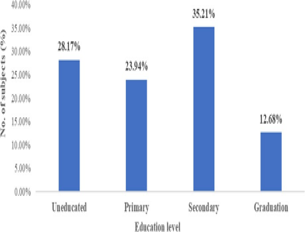Abstract
Tuberculosis (TB) is a highly contagious airborne disease caused by Mycobacterium tuberculosis that primarily affects the lungs. TB is a significant and major public health emergency globally. According to the WHO Global Tuberculosis Report 2020, 10 million people developed TB disease in the year 2019. The main objective of the study was to assess the level of knowledge, attitude and practice in TB patients. The study also reveals the association between KAP and the demographics of the subjects. An observational study was employed to collect data from a total of 71 subjects. Both quantitative and qualitative statistical analysis were adopted. From the findings, the mean age of the study population was 45.5 ± 13.96 years. Over 15.50% of subjects appeared to have adequate knowledge, 87.33% of subjects had a fair attitude, and around 58% of subjects were reported to have good practices towards TB. A weak positive correlation between knowledge and attitude (p = 0.051), weak positive correlation between knowledge and practice (p = 0.138) whereas, a significant and moderately positive correlation between attitude and practice (p = 0.002) was observed. The mean knowledge scores of graduates and post-graduates were higher in comparison with other study subjects. The study findings showed that the majority of subjects had several misconceptions about TB and hence prioritized interventions and more awareness programs at the root levels are needed to aid TB control and eradication.
Full text article
References
Esmael, A., Ali, I., Agonfir, M., Desale, A., Yaregal, Z., Desta, K. 2013. Assessment of Patients’ Knowledge, Attitude, and Practice Regarding Pulmonary Tuberculosis in Eastern Amhara, Ethiopia. The American Journal of Tropical Medicine and Hygiene, 88:20.
Hoa, P. N., Thorson, K. E. A., Long, H. N., Diwan, K. V. 2003. Knowledge of tuberculosis and associated health-seeking behaviour among rural Vietnamese adult with a cough for at least three weeks. Scand J Public Health, 31(Supple 22):59–65. Accessed: 21 June 2020.
Mushtaq, U. M., Majrooh, A. M., Ahmad, W., Rizwan, M., Luqman, Q. M., Aslam, J. M. 2010. Knowledge, attitude and practices regarding tuberculosis in two districts of Punjab, Pakistan. International Journal of Tuberculosis and Lung Disease, 14(3):303–310. Accessed: 21 June 2020.
Savicevic, J. A., Popovic-Grle, S., Milovac, S., Ivcevic, I., Vukasovic, M., Viali, V. 2008. Tuberculosis Knowledge among patients in outpatients setting in split, Croatia. International Journal of Tuberculosis and Lung Disease, 12(7):780–785. Accessed: 21 June 2020.
WHO 2008. Advocacy, communication and social mobilization for TB control (ACSM for TB control): A guide to developing KAP surveys 2008. World Health Organization. Accessed on: 5 March 2020.
WHO (TB Report) 2020. Global Tuberculosis Report. World Health Organization. COPYRIGHT CC BY-NC-SA 3.0 IGO. Accessed on: 4 March 2020.
Authors

This work is licensed under a Creative Commons Attribution-NonCommercial-NoDerivatives 4.0 International License.

